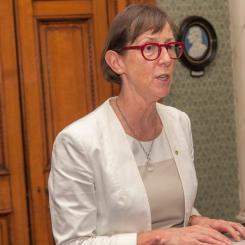 Dr Adrienne Flanagan
Dr Adrienne Flanagan
UCL Cancer Institute
Awarded: £250,000
The challenge
There has been little change in terms of improved survival of patients with sarcoma over the last 40 years. Sarcomas include about 70 different subtypes involving bone, muscle, fat, blood vessels and joints and represent 2% of all cancers, presenting across all age groups. Like other cancers, sarcoma is caused by changes in our genetic code, much like spelling errors in the instructions for our genetic make-up. Such alterations can be detected by reading the DNA in a patient’s tumour and comparing it with DNA from their healthy tissues. Since publication of the first human genome in 2003, sequencing of the genetic code of thousands of different cancers has revolutionised our understanding of disease, and in some cases the treatments for specific tumours, a small number of which are sarcomas. These advances stimulated the UK Government to initiate the 100,000 Genomes Project, a huge piece of work which involved sequencing 50,000 genomes from patients with cancer, with the aim of improving healthcare through the development of personalised medicine.
How will this project tackle this challenge?
Approximately 1000 patients with sarcoma were recruited to the project by the end of 2018. In response to this scientists with expertise in data analysis and clinicians with expertise in sarcoma have come together to form the Sarcoma Genomics England Clinical Interpretation Partnership (GeCIP).
GeCIP will undertake research on this unique resource of genomic and clinical data, with the aim of developing personalised medicine for patients with sarcoma. The data produced by the work will be made available to a wide range of researchers for future projects, and a cohesive multidisciplinary UK-wide sarcoma network will be build. This network will be extended globally, with patient input, to facilitate future clinical trials, research and education.
What this means for people affected by sarcoma
This project takes the data collected as part of the UK Government’s 100,000 Genomes Project and lays out the blueprint for how this data can be harnessed by research to work towards personalised treatment for sarcoma patients. This is a large scale piece of work being undertaken by a huge team of researchers from all over the UK. It will create a major step forward in sarcoma research. A collaboration on this scale, working towards one patient-orientated goal is a demonstration of science at its strongest.
Once the ground work of processing and cataloguing the data is done, for the first time researchers will be able to study the evolution and variation in genetic mutations in sarcoma, which will lead to great insights into the development of resistance and disease progression. Moreover, the comprehensive cataloguing of genetic alterations in sarcoma will be a critical resource which will allow chemists and pharmacologists to develop new drug development strategies.
A collaboration on this scale, working towards one patient-orientated goal is a demonstration of science at its strongest.












